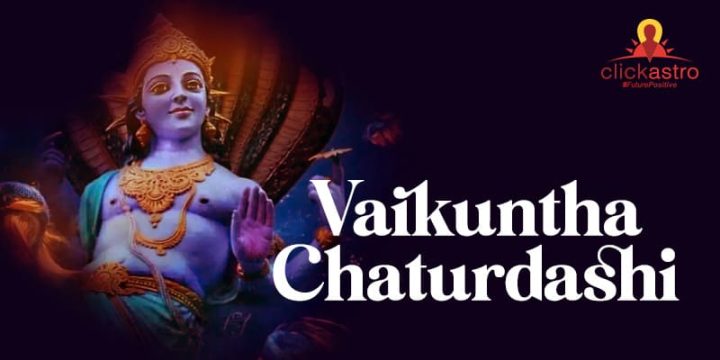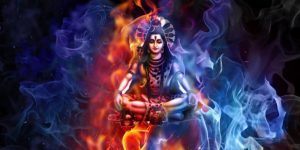Introduction
Vaikuntha Chaturdashi, celebrated on the
Chaturdashi Tithi of
Shukla Paksha in the Kartik month, is a unique and sacred festival dedicated to both Lord Vishnu and Lord Shiva. Unlike other occasions, where these deities are worshipped separately, this festival symbolises divine unity, fostering harmony between Shaivites and Vaishnavites. It marks a rare event where devotees honour both gods on the same day, seeking their combined blessings for prosperity, spiritual growth, and liberation (moksha). Celebrated a day before
Kartik Purnima, Vaikuntha Chaturdashi is associated with fasting, prayers, and rituals performed at specific auspicious times.
In 2025, Vaikuntha Chaturdashi will be observed on November 4, with devotees engaging in midnight prayers for Lord Vishnu and early morning worship for Lord Shiva. The festival holds particular significance in places like Varanasi, Rishikesh, and Gaya, where elaborate rituals are performed to mark this spiritual occasion. It is believed that observing this vrat ensures the fulfilment of desires and liberation from the cycle of rebirth.
Open the doors to fortune and faith — Check your Horoscope now!
What is Vaikuntha Chaturdashi?
Vaikuntha Chaturdashi highlights the harmonious worship of both Lord Vishnu and Lord Shiva. Unlike most festivals, which focus on the veneration of a single deity, Vaikuntha Chaturdashi offers a rare occasion when devotees honour both gods together, recognising their shared role in the cosmic balance. It signifies the belief that Vishnu and Shiva are not separate forces but complementary aspects of the divine.
The festival is particularly celebrated in Varanasi, Rishikesh, Maharashtra, and other sacred sites. Devotees observe strict fasts (vrat) and participate in rituals throughout the day and night, performing special prayers at Vishnu and Shiva temples. During the night, devotees offer lotus flowers to Lord Vishnu, and at dawn, they perform the ritual abhishek (holy bath) for Lord Shiva. Devotees believe that worshipping both deities on this day brings immense blessings, fulfilment of desires, and a deeper connection with the divine.
Date and Muhurat for Vaikuntha Chaturdashi 2025
- Date: November 4, 2025 (Tuesday)
- Nishita Muhurta (for Vishnu worship): 11:39 PM to 12:31 AM, November 5
- Chaturdashi Tithi Start: 2:05 AM, November 4, 2025
- Chaturdashi Tithi End: 10:36 PM, November 4, 2025
Significance of Vaikuntha Chaturdashi
Vaikuntha Chaturdashi symbolises the unity between Lord Vishnu and Lord Shiva, two of the most revered deities in Hinduism. The festival emphasises the principle that both deities, though worshipped under different traditions, represent the same divine essence.
According to legend, on Vaikuntha Chaturdashi, Lord Vishnu offers Bael leaves, traditionally sacred to Lord Shiva, as a gesture of devotion. In return, Lord Shiva presents Tulsi leaves, typically associated with Vishnu, to the preserver deity. This exchange symbolises the equality of both divine forces and teaches devotees the importance of respect, unity, and acceptance across different paths of worship.
Rituals are performed at two specific times during the night:
Nishita Muhurta (midnight):
Special prayers and offerings are dedicated to Lord Vishnu. Devotees present lotus flowers and chant Vishnu mantras, seeking his blessings.
Arunodaya Muhurta (pre-dawn):
This time is reserved for honouring Lord Shiva with rituals, including an abhishek (ceremonial bath) using water, milk, and other sacred substances.
These rituals reflect the dual focus of the festival, with equal devotion offered to both deities. Observing the vrat with sincerity is believed to purify the soul, remove past karma, and bring spiritual fulfilment. It is also said to invoke divine blessings for harmony, peace, and liberation from the cycle of birth and death.
The Legend Behind Vaikuntha Chaturdashi
Lord Vishnu once travelled to the sacred city of
Kashi (Varanasi) to worship Lord Shiva. Upon arrival, Vishnu took a purifying dip at the Manikarnika Ghat, a place believed to grant liberation to souls. Determined to offer 1,000 golden lotus flowers to Lord Shiva, Vishnu meticulously gathered them for his worship.
However, Lord Shiva decided to test Vishnu’s devotion. Before the ritual began, Shiva secretly hid one of the golden lotus flowers from the offering. When Vishnu counted the flowers and found one missing, he was deeply distressed but unwavering in his resolve to complete the offering. As an alternative, Vishnu decided to sacrifice one of his own eyes, as he is known as Kamal Nayan (the one with lotus-like eyes).
Moved by Vishnu’s selfless act of devotion and unwavering commitment, Lord Shiva appeared before him in his divine form. Pleased by the depth of Vishnu’s love, Shiva not only accepted the offering but also granted Vishnu the Sudarshan Chakra, a powerful celestial weapon representing divine wisdom, protection, and strength.
This story symbolises the importance of dedication and unconditional devotion, teaching that the ultimate goal of worship is surrender and purity of heart. It also reflects the mutual respect between Lord Vishnu and Lord Shiva, showing that those who honour both deities on Vaikuntha Chaturdashi will transcend worldly attachments and achieve Vaikuntha (heaven).
Vaikuntha Chaturdashi Vrat Katha
The Vaikuntha Chaturdashi vrat katha revolves around a sinful Brahmin named Dhaneshwar, whose life took a miraculous turn due to the divine grace associated with this sacred day.
Dhaneshwar was known for his immoral ways, engaging in wrongdoings throughout his life. As a result, he was destined to suffer the consequences of his sins in the afterlife. However, on the day of Vaikuntha Chaturdashi, fate brought him to the
Godavari River. Without realising the significance of the day, Dhaneshwar bathed in the river, which is considered highly sacred. Furthermore, he unknowingly came into contact with several devotees observing the Vaikuntha Chaturdashi vrat, thereby benefiting from their spiritual influence.
When Dhaneshwar’s time on Earth came to an end, Yama’s messengers arrived to take his soul to hell. However, Lord Vishnu intervened, preventing the messengers from taking Dhaneshwar away. Vishnu declared that since Dhaneshwar had bathed in the holy waters of the Godavari on Vaikuntha Chaturdashi and had unintentionally associated with devotees, he was absolved of his sins. Out of divine compassion, Vishnu granted Dhaneshwar a place in Vaikuntha (the celestial abode), ensuring his spiritual elevation and liberation.
This story teaches that even unintentional acts of devotion on Vaikuntha Chaturdashi can bring about spiritual transformation. It inspires devotees to believe in the power of grace and reminds us that no one is beyond redemption if they encounter the divine at the right moment. The Katha also encourages faith in the power of holy associations and participation in sacred rituals, however small or unintentional they may be.
Rituals and Puja Vidhi of Vaikuntha Chaturdashi
Vaikuntha Chaturdashi is observed with great devotion by devotees who perform specific rituals throughout the day to seek blessings, cleanse sins, and attain moksha (liberation). Below is the step-by-step puja vidhi to observe the festival correctly.
1. Morning Bath and Fasting
Wake up during
Brahma Muhurta (approximately two hours before sunrise) and take a holy bath. Many devotees visit the Manikarnika Ghat in Varanasi to perform the sacred Manikarnika Snan, considered highly auspicious.
Take a vow to fast for the day (Sankalp) with a prayer to both Vishnu and Shiva. This fast is observed with strict discipline, avoiding grains and cereals. Fruits, milk, and water are allowed, depending on individual capability.
2. Preparation of the Puja Area
Clean the puja space thoroughly and set it up facing the east to invite positive energies.
Place idols or images of Lord Vishnu and Lord Shiva next to each other, symbolising unity and mutual respect between the two deities.
3. Offering Prayers to Vishnu and Shiva
Abhishek (ritual bathing) of the idols is performed using water, milk, curd, ghee, sugar, and perfume. This step signifies the purification of the soul and mind.
Light a ghee lamp mixed with saffron to illuminate the altar and incense sticks of sandalwood to invoke divine presence.
Offer flowers, especially lotus flowers for Vishnu and Bael leaves for Shiva. Tulsi leaves are also offered to Vishnu as a symbol of devotion.
Place fruits, sweets, and a special dish like maize flour kheer (a traditional sweet) as bhog (a sacred offering) for both deities.
4. Chanting Mantras
Mantra chanting is an essential part of the Vaikuntha Chaturdashi puja. Devotees chant the following:
Vishnu Mantra:
ॐ नमो भगवते वासुदेवाय (Om Namo Bhagavate Vasudevaya)
Shiva Mantra:
ॐ नमः शिवाय (Om Namah Shivaya)
Devotees also recite the Vishnu Sahasranama (1000 names of Vishnu) and other hymns dedicated to Shiva, enhancing the spiritual atmosphere.
5. Special Rituals During Muhurta Timings
Perform a special puja for Vishnu at midnight during the Nishita Muhurta, which is an ideal time for worshipping the deity.
Before sunrise, during the Arunodaya Muhurta, offer prayers to Lord Shiva. The timing of these rituals holds immense significance, as it reflects the divine synchronisation between both gods.
6. Charity and Donations
After completing the puja, devotees distribute food to Brahmins and offer charity. Donating clothes, food, and other essentials to the needy is highly recommended.
Lighting lamps at temples, ghats, and homes is considered auspicious, as it symbolises the victory of light over darkness.
Taking a holy dip in the Ganga or other sacred rivers on Vaikuntha Chaturdashi is believed to wash away sins and bring spiritual purification.
Benefits of Observing Vaikuntha Chaturdashi
Vaikuntha Chaturdashi offers several benefits to devotees who observe the fast with devotion and sincerity. Below are the primary benefits of observing this festival.
1. Fulfilment of Desires
It is believed that those who worship Vishnu and Shiva together on Vaikuntha Chaturdashi experience the fulfilment of their aspirations and wishes. Whether seeking material prosperity, peace, or success, sincere prayers on this day invoke the blessings of both deities, ensuring that desires manifest positively.
2. Attainment of Moksha (Liberation)
One of the key benefits of Vaikuntha Chaturdashi is the promise of moksha—freedom from the endless cycle of birth and rebirth. Devotees believe that performing the vrat and rituals with full faith helps them attain Vaikuntha, the heavenly abode of Vishnu, and ensures liberation from worldly attachments.
3. Removal of Sins and Karmic Cleansing
Participating in the sacred baths (like the Manikarnika Snan) and chanting mantras dedicated to Vishnu and Shiva are believed to wash away past sins. Vaikuntha Chaturdashi is seen as an opportunity for karmic purification, where devotees can unburden themselves from their mistakes and negative actions.
4. Promotion of Unity and Harmony
This festival symbolises mutual respect and harmony between two prominent traditions—Shaivism and Vaishnavism. Observing Vaikuntha Chaturdashi inspires devotees to rise above sectarian differences and embrace unity. It teaches that reverence for all forms of divinity fosters spiritual growth and societal harmony.
Celebration of Vaikuntha Chaturdashi in Varanasi
The
Kashi Vishwanath Temple in Varanasi plays a central role in the celebrations of Vaikuntha Chaturdashi, attracting thousands of devotees. The temple, revered as one of the holiest sites dedicated to Lord Shiva, is believed to embody the divine essence of Vaikuntha on this day.
One important ritual performed at the Kashi Vishwanath Temple is the exchange of sacred leaves between the two deities. Lord Vishnu, typically associated with Tulsi (holy basil), is honoured with Bael leaves, a symbol of Shiva. Similarly, Lord Shiva is adorned with Tulsi leaves in a rare display of mutual reverence.
In addition to the special rituals, processions, bhajans (devotional songs), and night-long worship fill the temple premises are filled with fervour and devotion. Devotees fast throughout the day, perform the Manikarnika Snan (holy dip) in the Ganges, and offer prayers seeking the blessings of both deities.
Conclusion
Vaikuntha Chaturdashi 2025 presents a powerful opportunity for spiritual elevation through the worship of Lord Vishnu and Lord Shiva. This festival highlights the values of unity, devotion, and inner transcendence, encouraging devotees to rise above divisions and embrace divine harmony. Observing the vrat (fast), engaging in prayers, and practising charity on this day helps purify the mind and heart, inviting the blessings of both deities for a life filled with peace and prosperity.
Whether celebrated through simple rituals at home or with grandeur at sacred temples like Kashi Vishwanath, Vaikuntha Chaturdashi holds the promise of spiritual fulfilment and liberation. By fasting with sincerity, offering bhog and flowers, and chanting sacred mantras, devotees can progress on the path to moksha (salvation).








